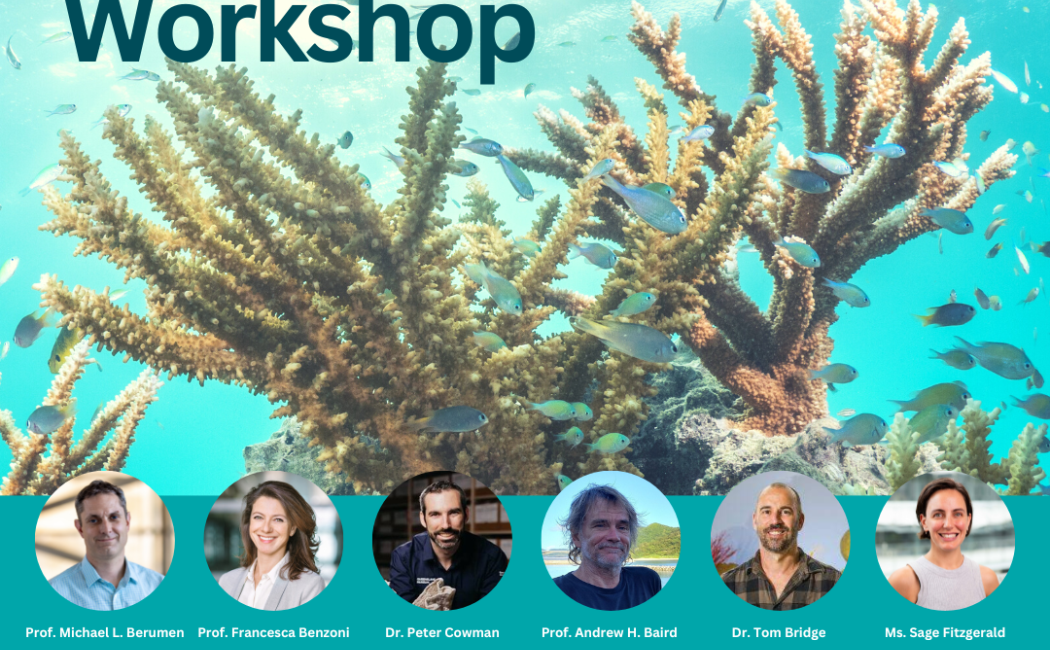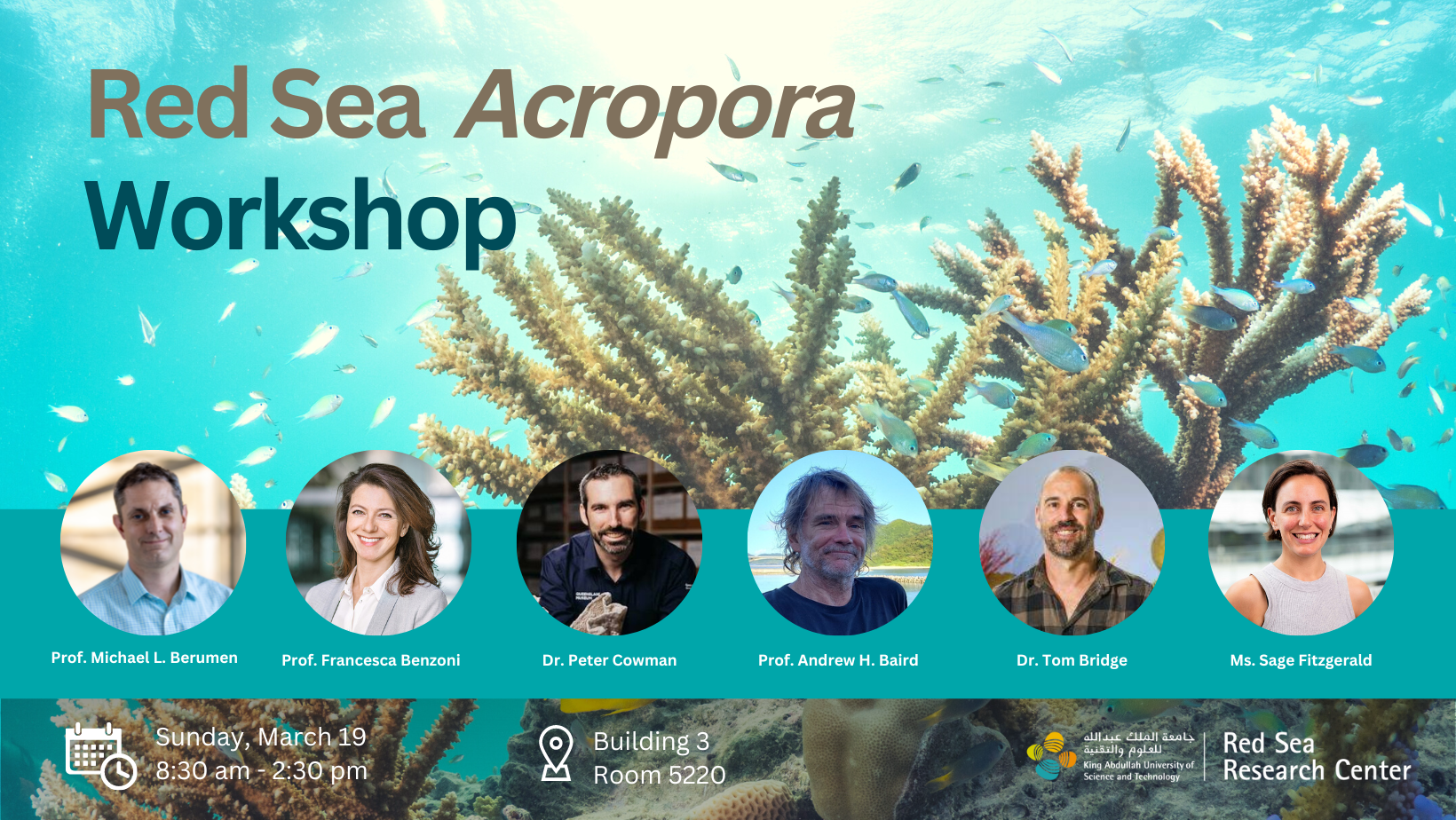



| 8:30-8:45am | Coffee and Tea | |
| 8:45-9:00am | Workshop Opening | Prof. Michael L. Berumen |
| 9:00-9:45am | Title: Red Sea reef corals: how much uniqueness to manage? | Prof. Francesca Benzoni |
| 9:45-10:30am | Title: Phylogenomics reveals the hidden diversity of staghorn corals | Dr. Peter Cowman |
| 10:30-10:45am | Coffee and Tea | |
| 10:45-11:30am | Title: The nominal Acropora coral species of the Red Sea | Prof. Andrew H. Baird |
| 11:30-1:00pm | Lunch | |
| 1:00-1:45pm | Title: "That’s not tenuis”: traditional taxonomy obscures systematics and biogeography in Acropora | Dr. Tom Bridge |
| 1:45-2:30pm | Title: Oceans Apart: Uncovering the high diversity and endemism of tabulate Acropora | Sage Fitzgerald, Phd Student |
Presenter: Dr.Peter Cowman
Title: Phylogenomics reveals the hidden diversity of staghorn corals
Abstract: Species names and geographic ranges form the basis of biodiversity science and ultimately inform conservation policy. As such, un-named, un-described and unresolved species are not accounted for in conservation research. Here we use a phylogenomic dataset of >2500 conserved loci for 881 staghorn corals (Acropora) collected from 24 locations across the Indo-Pacific to highlight the extensive hidden diversity on coral reefs. Our results identify over 250 ‘primary species hypotheses’, of which only ~30% can be confidently assigned to a nominal species. The remaining lineages represent species that are either unresolved or undescribed. A geographic assessment of currently accepted species that our phylogenomic analyses resolve shows little overlap in coral assemblages between biogeographic regions across the Indo-Pacific and along the Great Barrier Reef. As a consequence, lineages thought to be geographically widespread have much narrower distributions, particularly at peripheral locations. Our findings have important implications for understanding contemporary biodiversity patterns on coral reefs, connectivity among reef bioregions and the outcomes of proposed conservation and intervention measures. Given the increasing spatial footprint and severity of disturbances on reefs globally, the high proportion of dark diversity for corals highlights the urgent need for accurate information on the identity and distribution of these key ecosystem engineers.
Presenter: Prof. Andrew H. Baird
Title: The nominal Acropora coral species of the Red Sea
Abstract: Over the last twenty-five years molecular research and revisiting the type material has revealed that the morphological taxonomic framework developed in the 1980s is fundamentally flawed. In particular, almost all of the synonymies from this period are incorrect and the species richness of the coral fauna has been vastly underestimated. Therefore, most of the research based on this framework, in particular all coral biogeography and assessments of vulnerability to extinction, needs to be revisited. But before this can be done coral taxonomy needs to be re-invented almost from scratch. Part of the process of reinvention involves testing all of the nominal species of corals by reference to the type material and the collection of topotypes to allow for molecular analysis. The primary aim of the KAUST Acropora taxonomy workshop is to identify topotypes for the 34 nominal species with a type location in the Red Sea from within the Red Sea coral collection of Prof Michael Berumen and colleagues. Of these 34 nominal species 20 are in synonymy, 8 are unresolved and therefore only 6 are currently accepted. We will then aim to identify most of the 500+ Acropora specimens in the collection, including what are bound to be numerous undescribed species. This is an exciting time to be a taxonomist.
Presenter: Dr. Tom Bridge
Title: “That’s not tenuis”: traditional taxonomy obscures systematics and biogeography in Acropora
Abstract: Molecular phylogenetics has fundamentally altered our understanding of the taxonomy, systematics and biogeography of corals. Recently-developed phylogenomic techniques have started to resolve species-level relationships in the diverse and ecologically-important genus Acropora, providing a path to resolve the taxonomy of this notoriously problematic group. In this talk, I will present data on some of our recent work examining species boundaries and systematic relationships within an Acropora clade containing the putatively widespread model species A. tenuis and its relatives. Using maximum likelihood phylogenies of targeted loci and genetic clustering of SNPs from specimens collected across the Indo-Pacific, we show that the clade includes at least twelve distinct lineages, only five of which correspond to currently accepted species. Systematic relationships revealed by our molecular phylogeny are incongruent traditional morphological taxonomy, and demonstrate that many characters traditionally used to delineate species boundaries and infer evolutionary history are homoplasies. Furthermore, we show that species within this clade have much smaller geographic ranges than currently thought; for example, only one endemic lineage occurs in the Red Sea/Arabian Gulf. Our results demonstrate that the current taxonomy of Acropora based exclusively on morphology does not reflect species boundaries or systematic relationships in the group, a finding with profound implications for conservation and management of reef corals.
Presenter: Sage Fitzgerald (Phd Student)
Title: Oceans Apart: Uncovering the High Diversity and Endemism of Tabulate Acropora
Abstract: The genus Acropora is a diverse group of coral species that play a crucial role in coral reef ecosystems, yet recent advances in molecular technologies have highlighted our limited understanding of the true taxonomic diversity of this group. Tabulate Acropora is of particular interest to both research and conservation due to its crucial role in maintaining reef architectural complexity but is vulnerable to local disturbances and the impacts of climate change. This tabulate clade has a wide distribution from the Red Sea to the Pacific Ocean, however, past findings have indicated that the taxonomic resolution of this group is poor, with far greater diversity than currently accepted. Our integrated taxonomic approach, combining molecular phylogenetics and morphological analysis, has uncovered a significantly higher species diversity and smaller geographic ranges for many species of tabulate Acropora than previously estimated. This talk will present a summary of our findings to date and their significance for the future of coral research and conservation.